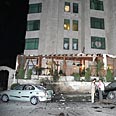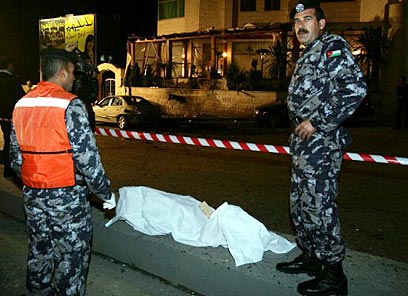
Israeli killed in Jordan blasts
Victim's uncle slams terrorists in talk with Ynet; senior Palestinian security officials also among scores killed in hotel bombings.
The body of an Israeli man killed in the terror offensive in Jordan’s capital Wednesday night has been identified, the Foreign Ministry said.
The victim has been identified as 40-year-old Husam Fathi Mahajna from the Arab-Israeli town of Umm al-Fahm. His family has been notified of the tragedy, the Ministry added.
Mahajna’s uncle, Yusuf, told Ynet family members were never concerned about the victim’s regular trips to Jordan.
“Everything is peaceful in Jordan. Who even thought terror would hit there too?” the uncle said minutes before crossing the border into Jordan to retrieve Mahajna’s body.
Yusuf said Mahajna, a paint dealer by trade, realized the Israeli-Jordanian peace agreement could be utilized to promote business and would visit Jordan every few days.
“He didn’t worry and we didn’t worry, and therefore we never warned him,” the uncle said.
Mahajna, a married father of three, met with his uncle for the last time Wednesday afternoon.
“When we read in the evening about the terror attacks we realized the worst may have happened,” Yusuf said. “We immediately tried to call his cell phone. The phone rang and rang, but there was no answer. We called relatives in Jordan and realized he must have been hurt in the attack.”
“It pains the heart, to kill people just like that,” Yusuf said. “I have no answer for such crazy people who choose to hurt innocents. I have nothing to tell them.”
Senior PA security officials killed
Two senior Palestinian security officials were also among the scores killed in the series of explosion that rocked three Amman hotels, the Palestinian ambassador to Jordan reported Thursday.
Jordanian authorities said at least 67 people were killed in the blasts.
According to the PA envoy, the senior security figures killed are Bashir Nafa and Abed Alloun. Nafa, the Palestinian West Bank intelligence chief, headed the PA’s special forces in the past and is considered a close associate of PA Minister Mahmoud Dahlan.
The Palestinians also say that the PA’s economic attache in Cairo and a senior Palestinian banker were also killed in the blasts.
While no group has yet to claim responsibility for the bombings, suspicion immediately fell on senior al-Qaeda member Abu Musab al-Zarqawi.
Jordan’s Deputy Prime Minister Marwan Muasher said al-Zarqawi was almost certainly a top suspect, and a U.S. counterterrorism official, who spoke on condition of anonymity, said there was strong suspicion of al-Zarqawi involvement because of his known animosity toward Jordan and the fact that suicide bombers were involved, one of his hallmarks.
Al-Zarqawi is most known for the string of devastating suicide attacks that his group, called al-Qaida in Iraq, has launched in Iraq, often against U.S. targets but also against Shiite Iraqis.
He has shown a flair for propaganda, drawing wide support among terrorists in the region. But outside Iraq, and especially in Jordan, he has been equally active.
He was sentenced to death in absentia by a Jordanian military court for the October 2002 assassination of a U.S. diplomat, Laurence Foley, in Amman.
His group is also accused of previously trying to blow up a hotel in Amman as part of the so-called Millennium plot in 1999 and of an attack this August on a U.S. Navy ship in the Jordanian port of Aqaba that killed one Jordanian soldier.

Scene of Amman bombing (Photo: AFP)
The son of Palestinian refugees, al-Zarqawi grew up in the Jordanian town of Zarqa and in 1989, traveled to Afghanistan. He was arrested in Jordan in 1992, and spent seven years in a Jordanian prison for trying to overthrow the country’s monarchy.
On his release, he became involved in the Millennium plot attempt to blow up the Radisson SAS Hotel in Amman - one of the hotels hit Wednesday. He fled Jordan and returned to Afghanistan, where U.S. officials say he set up terror training camps.
In 2001, al-Zarqawi was arrested again in Jordan, but was soon released.
The bombings
Three suspected suicide bombers blew themselves up at three international hotels in Jordan’s capital on Wednesday, killing at least 57 people and injuring more than 300 others.
The attacks took place at the Radisson SAS, Grand Hyatt and Days Inn hotels. The Radisson is known to be popular with Israeli tourists, but there was no confirmation of the nationality of any of the dead or wounded. Witnesses said many Western tourists were staying at the three hotels.
King Abdullah said following the bombings that “justice will reach the criminals.”
“These terrorist attacks are criminal acts executed by terror groups,” said the King who is currently abroad.
“Jordan remains determined to pursue the struggle against terrorism, terrorist groups and all those who support and justify their acts,” read a statement issued by the monarchy.
The Israeli Foreign Ministry said no reports of Israeli casualties have been received as of yet.
Israel’s ambassador to Jordan, Yaakov Hadas, told Israel’s leading news source Ynet, “Much to our joy, there are no Israeli casualties. A number of textile executives that stayed in one of the hotels have been taken out of there and will be sent back to Israel tonight. There is also a wrestling team that was on its way to a tournament in Qatar - they did not stay in the hotels; they are fine and will continue on their way on Thursday.
“A group of tourists from Abu-Gosh stayed at the Hyatt, and they too are fine. We are focusing our efforts on attempting to locate other Israelis in case they are n need of assistance.
"This is the first attack of its kind in Jordan; there was an attempt to carry out a huge attack last year, but it was thwarted. We have expressed our condolences to the Jordanian government and offered our assistance, but as of now they are not in need of our services. It is tumultuous here in the aftermath of the attacks; unfortunately, we in Israel are very familiar with this situation.”
The Israel Airports Authority has decided to open the Allenby Bridge in order to allow Israelis who wish to return from Jordan to do so before Thursday morning.










